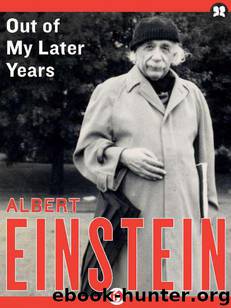Out of My Later Years: The Scientist, Philosopher, and Man Portrayed Through His Own Words by Albert Einstein

Author:Albert Einstein [Einstein, Albert]
Language: eng
Format: epub, mobi, azw3
ISBN: 9781453204931
Amazon: 1453204938
Publisher: Open Road / Philosophical Library
Published: 2011-03-15T04:00:00+00:00
20
Science and Society
THERE ARE TWO WAYS in which science affects human affairs. The first is familiar to everyone: Directly, and to an even greater extent indirectly, science produces aids that have completely transformed human existence. The second way is educational in character—it works on the mind. Although it may appear less obvious to cursory examination, it is no less incisive than the first.
The most conspicuous practical effect of science is that it makes possible the contriving of things that enrich life, though they complicate it at the same time—inventions such as the steam engine, the railway, electric power and light, the telegraph, radio, automobile, airplane, dynamite, etc. To these must be added the life-preserving achievements of biology and medicine, especially the production of pain relievers and preservative methods of storing food. The greatest practical benefit which all these inventions confer on man I see in the fact that they liberate him from the excessive muscular drudgery that was once indispensable for the preservation of bare existence. Insofar as we may at all claim that slavery has been abolished today, we owe its abolition to the practical consequences of science.
On the other hand, technology—or applied science—has confronted mankind with problems of profound gravity. The very survival of mankind depends on a satisfactory solution of these problems. It is a matter of creating the kind of social institutions and traditions without which the new tools must inevitably bring disaster of the worst kind.
Mechanical means of production in an unorganized economy have had the result that a substantial proportion of mankind is no longer needed for the production of goods and is thus excluded from the process of economic circulation. The immediate consequences are the weakening of purchasing power and the devaluation of labor because of excessive competition, and these give rise, at ever shortening intervals, to a grave paralysis in the production of goods. Ownership of the means of production, on the other hand, carries a power to which the traditional safeguards of our political institutions are unequal. Mankind is caught up in a struggle for adaptation to these new conditions—a struggle that may bring true liberation, if our generation shows itself equal to the task.
Technology has also shortened distances and created new and extraordinarily effective means of destruction which, in the hands of nations claiming unrestricted freedom of action, become threats to the security and very survival of mankind. This situation requires a single judicial and executive power for the entire planet, and the creation of such a central authority is desperately opposed by national traditions. Here too we are in the midst of a struggle whose issue will decide the fate of all of us.
Means of communication, finally—reproduction processes for the printed word, and the radio—when combined with modern weapons, have made it possible to place body and soul under bondage to a central authority—and here is a third source of danger to mankind. Modern tyrannies and their destructive effects show plainly how far we are from exploiting these achievements organizationally for the benefit of mankind.
Download
Out of My Later Years: The Scientist, Philosopher, and Man Portrayed Through His Own Words by Albert Einstein.mobi
Out of My Later Years: The Scientist, Philosopher, and Man Portrayed Through His Own Words by Albert Einstein.azw3
This site does not store any files on its server. We only index and link to content provided by other sites. Please contact the content providers to delete copyright contents if any and email us, we'll remove relevant links or contents immediately.
| Anthropology | Archaeology |
| Philosophy | Politics & Government |
| Social Sciences | Sociology |
| Women's Studies |
The remains of the day by Kazuo Ishiguro(8977)
Tools of Titans by Timothy Ferriss(8366)
Giovanni's Room by James Baldwin(7330)
The Black Swan by Nassim Nicholas Taleb(7109)
Inner Engineering: A Yogi's Guide to Joy by Sadhguru(6785)
The Way of Zen by Alan W. Watts(6601)
Asking the Right Questions: A Guide to Critical Thinking by M. Neil Browne & Stuart M. Keeley(5759)
The Power of Now: A Guide to Spiritual Enlightenment by Eckhart Tolle(5755)
The Six Wives Of Henry VIII (WOMEN IN HISTORY) by Fraser Antonia(5498)
Astrophysics for People in a Hurry by Neil DeGrasse Tyson(5182)
Housekeeping by Marilynne Robinson(4436)
12 Rules for Life by Jordan B. Peterson(4299)
Double Down (Diary of a Wimpy Kid Book 11) by Jeff Kinney(4261)
Ikigai by Héctor García & Francesc Miralles(4247)
The Ethical Slut by Janet W. Hardy(4242)
Skin in the Game by Nassim Nicholas Taleb(4239)
The Art of Happiness by The Dalai Lama(4125)
Skin in the Game: Hidden Asymmetries in Daily Life by Nassim Nicholas Taleb(3991)
Walking by Henry David Thoreau(3953)
